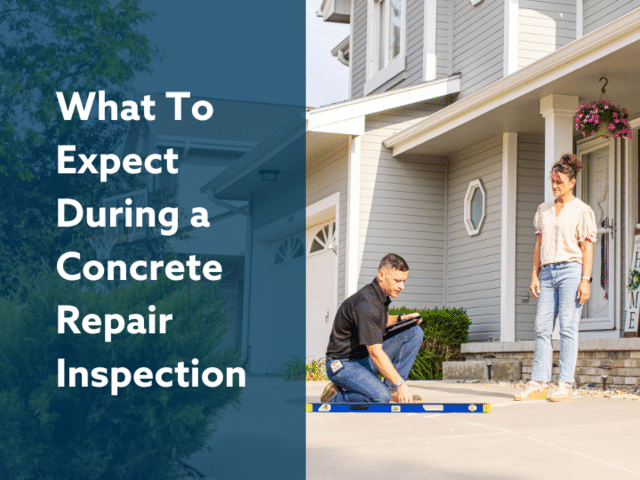Heavy Rains and Shifting Soil Impacts Your Foundation Walls
Here's the good news. There's nothing you can do to predict or prevent the sticking doors and windows, uneven floors and bowing walls that are caused by heavy rains, shifting soils and drought. It's a deeper issue. And by deep, we mean the layers of soil that are deep beneath your home that are literally out of sight and out of your control. But they can have a great impact on foundation walls.
It Starts with Poorly Compacted Fill Soil
From the time dinosaurs roamed, dirt in this area has seen everything from rain, snow and ice, baking sun and hot dry winds that have naturally compacted the soil. C.J. Fritz, Thrasher Foundation Repair's General Manager says they call it "virgin soil." "When you first build a home, you're building it on virgin soil. You dig a hole to plant a foundation and then backfill with loose soil," he says. "And, that's where some of the problems begin."
To level a site where a foundation will be built, builders sometimes bring in loose soil from another location to fill depressed or hollow areas. This newly moved "fill" soil is much looser than the dense, hard-packed soils at the site. If the fill is not compacted well, it may begin to compress underneath the weight of your new home. This can create settlement problems that can damage your foundation walls.
When builders use that same soil to "backfill" around the foundation, water will naturally saturate the looser compacted soil before it will the surrounding compacted soil. Ren Flickinger, Sales Manager at Thrasher says, "Our soil in this region is heavy. And it's super expansive when it gets wet. When it gets wet, it expands and has to make room for itself. And when it dries out, it contracts leaving a whole bunch of cracks and voids, to allow even more moisture towards the foundation."
Clay-based Soil is a Culprit
Soils in the Midwest are rich in clay and silt and have the greatest potential to damage a foundation. Clay absorbs water easily, expanding in volume as it becomes more saturated. So-called "expansive clays" can cause foundations to crack, heave and shift. Also, these kinds of clay-rich soils are heavier than other soil types and this creates unwanted pressure on a foundation wall.
It turns out this is measurable according to Jeff Kortan, the Senior Director of Engineering, at Supportworks. "Engineers model soil as if it was a fluid - equivalent fluid weight is the term they use. For example, a cubic foot of water is 62.4 lbs." So, after a bunch of engineering math that considers a mix of pressure and force, the bottom line is that "saturated expansive clay can put several tons of pressure per square foot of your 8-inch thick basement walls," says Kortan.
No Wonder Foundation Walls Need a Little Help
"Realistically, walls can move four different ways; they can move up or down, in or out. The most common movement we see is walls moving down, which would indicate a settlement problem, or walls moving in, which would be like a bowing wall problem," says Flickinger. "When clay soils dry out, they shrink and crack, leaving gaps around a house where water from the next storm can penetrate easily and deeply to repeat the expansion cycle.
Clay-rich soils usually cause more foundation damage by expanding than by contracting." Fritz understands this on a deeply personal level. When he built his own home, he experienced water entering through his foundation wall. After the builder went out of business, he sought out Thrasher and learned how some of the builder's shortcuts resulted in his headaches. He was so pleased with Thrasher's results and how much he learned from the process, that he soon came to work here. 
Keep Your Eyes Out for Cracks
While there is nothing you can do about the soil beneath your home, you can keep an eye on what's happening inside your home. "That's where we see the clues that something is shifting," according to Flickinger. That includes obvious clues like cracks in foundation walls and some not so obvious ones.
"We always look at cracking patterns. Cracks will tell you a lot about which way your home is moving or which way that wall is moving. And then also we look for trends upstairs like sticky doors and windows, uneven floors or uneven door frames. We take a look at every doorframe and see if they're uneven and if they're all pointing to one direction. That would be a trend that we'd pay attention to. All these things are what we're looking for when we suspect a house has settlement," Flickinger added.
What if I'm noticing symptoms?
So, if you suspect that you may have a foundation problem and you feel in over your head about what's happening beneath your feet, call the experts. As a foundation repair company in business for 45 years, Thrasher understands the ways that soils in Nebraska, Kansas, Iowa, and Missouri affect your home.
Our team of experienced system design specialists are ready to meet with you to explain what's happening with your foundation - and how to fix it. To help you decide what's best for your home, Thrasher provides each of our customers with a free in-home inspection and no-obligation estimate in writing, before you spend a dime with us. Each estimate includes a detailed proposal on how we plan to fix your foundation problem and protect your home. Call us today at 800.827.0702 or fill out this short form to schedule an inspection.
Article Categories:



